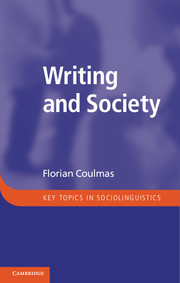Book contents
- Frontmatter
- Contents
- List of illustrations
- List of tables
- Preface
- Acknowledgements
- 1 The tyranny of writing and the dominance of vernacular speech
- 2 The past in the present and the seeds of the public sphere
- 3 Written and unwritten language
- 4 Literacy and inequality
- 5 The society of letters
- 6 Writing reform
- 7 Writing and literacy in the digitalized world
- Notes
- Bibliography
- Index
4 - Literacy and inequality
Published online by Cambridge University Press: 05 February 2013
- Frontmatter
- Contents
- List of illustrations
- List of tables
- Preface
- Acknowledgements
- 1 The tyranny of writing and the dominance of vernacular speech
- 2 The past in the present and the seeds of the public sphere
- 3 Written and unwritten language
- 4 Literacy and inequality
- 5 The society of letters
- 6 Writing reform
- 7 Writing and literacy in the digitalized world
- Notes
- Bibliography
- Index
Summary
The valuation of literacy is a significant factor for understanding how the state determines the nature and extent of democracy.
(Creppell 1989: 25)Literacy in the public sphere
Having established the major differences between spoken and written language, we can now return to the social significance of writing, in particular to its function for the public sphere. In Chapter 2, we saw that the seeds of the public sphere were already sown in the Greek city states of antiquity, where a ‘separation between the public and the private person’ (McGuigan 1996: 147) developed and writing became part of the communication ecology. It was the reification of the message in writing that made the dissociation of content and transmission an experiential reality for the educated elite. From then on, writing furnished the foundation on which grew Europe's culture of rationality, of examining texts for their inherent merit and consistency irrespective of the author, a culture that appealed to reason rather than emotion.
In this spirit the public sphere is the sphere of rationality. In retrospect its modernizing function is associated with overcoming the absolute power of the monarch in pre-modern Europe, with enlightenment and the emergence of bourgeois society, and with democracy. Habermas (1991: 32) pinpointed ‘the golden age’ of the public sphere in the half-century between 1680 and 1730. The public sphere was then the realm of social life where private citizens assembled, free from state supervision, to engage in rational argument and debate beyond personal interest and circles of acquaintance. It would seem that the public sphere requires as a precondition a literate community ready to receive information in the absence of an informer, a message that has an originator who, however, is not co-present with the recipient.
- Type
- Chapter
- Information
- Writing and SocietyAn Introduction, pp. 60 - 80Publisher: Cambridge University PressPrint publication year: 2013

